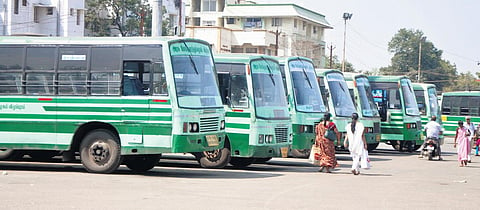

A year ago, I had to see a surgeon in Chennai. When I told him what I do — guide cities in creating better public transport — his face lit up. “Those good old days,” he said, “when I could go anywhere on Pallavan transport.” I have gotten the same reaction from almost everyone, aged fifty or more, I have met in Chennai. The state-run city bus service — which has since been renamed the Metropolitan Transport Corporation — used to be the city’s lifeline. Buses were everywhere and took you wherever you wanted to go. Everyone trusted them. That is, till two decades ago.
Chennai has since doubled in size and population. But its bus fleet has remained stagnant. Today, less than 3,500 buses serve this mega city of over 1.2 crore people, a mere three buses for every 10,000 residents. Cities of comparable size, like Singapore or London, have four times as many buses per capita.
A study by my team showed that only 6 out of 10 Chennaites could find a bus, often infrequent, within a 10-minute walk. With broken or missing footpaths, the walk to bus stop is mostly unpleasant and often scary. No wonder people are shifting to personal motor vehicles — motorbikes, then cars — as soon as they can afford them.
Rather than improving bus services — which are often the only means of transport for many, especially women, children, and the elderly — the state has been pouring precious public funds into flyovers in the hope of fixing the ever-worsening traffic congestion. But that is a fool’s errand. More roads attract more traffic even if public transport is good. You cannot beat obesity with bigger pants! My team estimates Chennai loses `4,000 crore yearly to traffic congestion.
Chennai has a really attractive metro rail now. However, the first phase of the metro, a 45 km network built at a whopping Rs 24,000 crore, reaches a mere 16% of residents and is transporting just about 2 lakh people every day. In sharp contrast, despite being a shadow of its past, Chennai’s bus service transports 35 lakh commuters every day. This is not surprising. London, which has the oldest and one of the largest rail networks, has more people travelling on buses than on its trains. Now, imagine cool buses everywhere — that look, feel, and run like a metro but are flexible like motorbikes to take you wherever you want directly, whenever you want, without waiting, and in comfort, and not blow a hole in your pocket like expensive fuel or cab rides. This dream can become a reality in under three years, at a fraction of the cost of metro rail, if the state makes mobility of citizens its priority.
So, what should be done? The state must immediately double Chennai’s bus fleet and add more buses as the city grows. Not any buses! A world-class service starts with cool buses: one quality, high quality for everyone. Consider air-conditioned buses to beat heat, low-floor ones that getting into buses doesn’t feel like climbing Everest, and electric ones to keep the air we breathe clean. But more buses and cool buses aren’t enough. They must have a clear way — 160 km of express busways in Chennai, at least half of which should and can be built by 2030.
Is it fair to give buses a dedicated lane when roads are already congested? Buses transport 10 times more people in the same amount of space than cars. No amount of additional road space can solve the traffic problem. But, a network of dedicated busways gives everyone the option to beat the traffic to get to their destinations on time every time.
Such a transformation would cost money, but the state must ensure that buses remain affordable. A good metric is to keep fares half of the cost of using a motorbike. The state must bridge the gap. It would be money well spent to give everyone hassle-free mobility.
Buses can be the answer to Chennai’s mobility woes. Let’s ask for more buses, cool buses, and fast buses, today.
Footnote is a weekly column that discusses issues relating to Tamil Nadu. Shreya Gadepalli is the founder and managing trustee of UrbanWorks, a think-n-do-tank that works with govt and non-govt stakeholders to make cities work for everyone through research, communication, and training